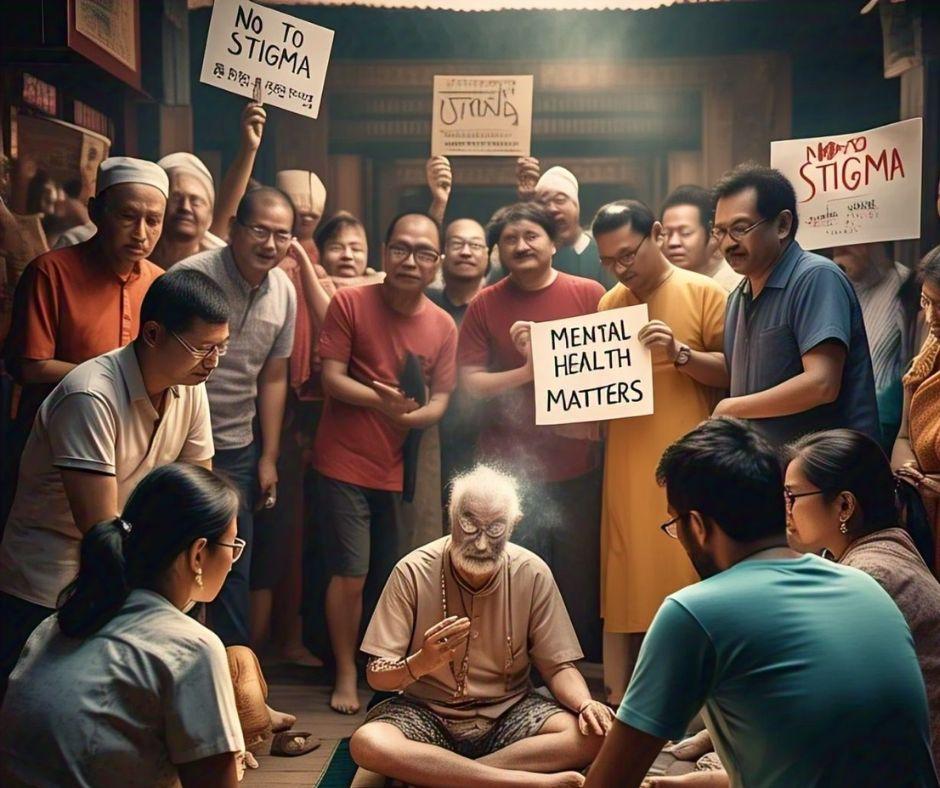 0
0

Stigmatisation of People with Mental Illnesses in Singapore
Singapore
Feb 19 2025
Article contributed by: Tay Tghee Khee
Mental Health Stigmatisation
Mental health stigmatisation, or in short, stigma, refers to negative attitudes, beliefs and stereotypes people may hold towards Persons with Mental Illnesses (PMI) (Centers for Disease Control and Prevention [CDC], 2024). Despite the growing efficacy of mental health treatment and care in Singapore, there is still a big treatment gap, i.e. the difference between the number of individuals in need of mental health care and those who receive treatment (World Health Organization [WHO], 2004). Much of this gap stems from stigma discouraging PMI from receiving treatment. This article discusses the cultural, religious and societal factors causing stigma, as well as the results of such stigma in our society
Culture and Religion
The stigma of PMIs is deeply rooted in our culture. Singapore is a multicultural society comprising of mostly the Chinese (74.3%), Malays (13.5%) and Indians (9.0%) (Singapore Department of Statistics, 2021). Within all 3 communities, cultural norms and aetiological religious beliefs (serving to explain an abnormal condition by giving a cause or reason for it, often in historical or mythical terms) are major contributing factors to the stigma of PMIs in Singapore.
The cultural norm of “面子” (face) within the Chinese is deeply intertwined with the stigmatisation of PMI. “面子” is central to social identity and representative of power and standing in the Chinese social hierarchy. The diagnosis of mental illnesses directly results in a loss of face, where he or she is deemed socially powerless (Yang, 2007). Furthermore, aetiological (mythical explanation) beliefs of mental illness among the Chinese may contribute to stigma, such as mental illness being a punishment for misconduct by one’s ancestors, or from their previous lives. In addition, beliefs about mental illnesses being hereditary implicates the family as being pathogenic (Lin & Lin, 1981). Such mythical beliefs and cultural norms directly contribute to the stigmatisation of PMI, as well as their family.
Aetiological beliefs within the Indian community influence stigma as well. Beliefs such as karma, black magic and punishment by God further reinforces the stigma of PMI. The association of mental illnesses with karma, punishment by God or black magic leads to the belief that PMI deserved their condition due to angering a God or past misdeeds, resulting in their stigma.
Within the Malay community, stigma arises from misconceptions that mental illnesses arise from supernatural activities (Hanafiah & Van Bortel, 2015). The Muslim Malays are also likely to attribute the cause of mental illnesses to fate and religion (Swami et al., 2008). This results in PMIs being accused of not being spiritual or faithful enough to fight off evil spirits and thoughts and thus contributes to the stigmatisation of PMI within the Malay community.
Stigma arises from the negative cultural beliefs in all 3 major racial groups. This includes beliefs that mental illnesses are a result of misdeeds of ancestors, karma, black magic, lack of faith and evil spirits. These beliefs cause PMIs to be viewed as either lacking in faith, or deserving of their illnesses due to misdeeds, angering a God or karma, or consequences of one’s own actions. Furthermore, PMIs were found to undergo magic or religious treatment, which points to the misconception that mental illnesses are caused by supernatural influences (Kulhara et al., 2000).
Social Stigma
Outside cultural and religious factors, our society’s values and beliefs also contributes to the stigma of PMIs. Meritocracy is highly regarded and valued in Singapore and is reflected in its public education system, as well as its competitive scholarship system. Stigma towards mental illness may arise since many PMI have histories of disrupted academic or vocational careers, both of which are highly valued in a meritocratic society (Rüsch et al., 2010). Furthermore, this belief facilitates an elitist mindset within Singaporeans, resulting in negative evaluations and stereotypes towards “low status” groups (Madeira et al., 2019). This is a function of meritocratic beliefs being tied with the concept of a “Just World”, where each gets what they deserve. This derives the misconception that PMI are responsible for their own illnesses and their inability to achieve career or academic wise.
In Conclusion
There are growing research evidence showing that common mental disorders, such as depression and anxiety, can be effectively managed through evidence-based treatments, including counselling, psychotherapy, and medication (Ministry of Health, 2023). These services are readily available in Singapore. However, despite their accessibility, societal stigma continues to discourage help-seeking. Many individuals with mental health conditions avoid treatment due to concerns that it may be “on their record” and could impact their careers or social standing (Tan et al., 2020). Left untreated, mental disorders can lead to functional impairment, substance abuse, or even suicide. As a society, we must work towards dismantling this stigma by fostering awareness, promoting education, and encouraging those in need to seek professional help.
References:
- Centers for Disease Control and Prevention. (2024, August 8). Mental health stigma. Mental Health. https://www.cdc.gov/mental-health/stigma/index.html
- World Health Organization. (2004). The treatment gap in mental health care. Bulletin of the World Health Organization. https://www.scielosp.org/pdf/bwho/v82n11/v82n11a11.pdf
- Singapore Department of Statistics. (2021). Singapore population statistics 2010–2020. https://www.singstat.gov.sg/-/media/files/publications/cop2020/sr1/findings.pdf
- Yang, L. H. (2007). Application of mental illness stigma theory to Chinese societies: Synthesis and new directions. Singapore Medical Journal, 48(11), 978–985. http://www.smj.org.sg/sites/default/files/4811/4811ra1.pdf
- Lin, T., & Lin, M. (1981). Love, denial, and rejection: Responses of Chinese families to mental illness. In Springer eBooks (pp. 387–401). https://doi.org/10.1007/978-94-017-4986-2_20
- Kulhara, P., Avasthi, A., & Sharma, A. (2000). Magico-religious beliefs in schizophrenia: A study from North India. Psychopathology, 33(2), 62–68. https://doi.org/10.1159/000029122
- Hanafiah, A. N., & Van Bortel, T. (2015). A qualitative exploration of the perspectives of mental health professionals on stigma and discrimination of mental illness in Malaysia. International Journal of Mental Health Systems, 9(1), Article 2. https://doi.org/10.1186/s13033-015-0002-1
- Swami, V., Arteche, A., Chamorro‐Premuzic, T., Maakip, I., Stanistreet, D., & Furnham, A. (2008). Lay perceptions of current and future health, the causes of illness, and the nature of recovery: Explaining health and illness in Malaysia. British Journal of Health Psychology, 14(3), 519–540. https://doi.org/10.1348/135910708×370781
- Rüsch, N., Todd, A. R., Bodenhausen, G. V., & Corrigan, P. W. (2010). Do people with mental illness deserve what they get? Links between meritocratic worldviews and implicit versus explicit stigma. European Archives of Psychiatry and Clinical Neuroscience, 260(8), 617–625. https://doi.org/10.1007/s00406-010-0111-4
- Madeira, A. F., Costa-Lopes, R., Dovidio, J. F., Freitas, G., & Mascarenhas, M. F. (2019). Primes and consequences: A systematic review of meritocracy in intergroup relations. Frontiers in Psychology, 10, Article 2007. https://doi.org/10.3389/fpsyg.2019.02007
- Ministry of Health. (2023). NATIONAL MENTAL HEALTH AND WELL-BEING STRATEGY. https://www.moh.gov.sg/docs/librariesprovider5/resources-statistics/reports/national-mental-health-and-well-being-strategy-report-(final).pdf
- Tan, G. T. H., Shahwan, S., Goh, C. M. J., Ong, W. J., Wei, K., Verma, S. K., Chong, S. A., & Subramaniam, M. (2020). Mental illness stigma’s reasons and determinants (MISReaD) among Singapore’s lay public – a qualitative inquiry. BMC Psychiatry, 20(1). https://doi.org/10.1186/s12888-020-02823-6
Related articles
The Importance of Mental Health Literacy
Exploring the Value of Counselling as a Long-Term Investment
If you like what you read, follow us on Facebook, Instagram or LinkedIn to get the latest updates.
Have a question? Reach out to us through our contact form or WhatsApp.
Want to speak to our clinicians? Book your appointment here!

Join Our Newsletter
Subscribe to our newsletter and receive daily updates & promotions!






